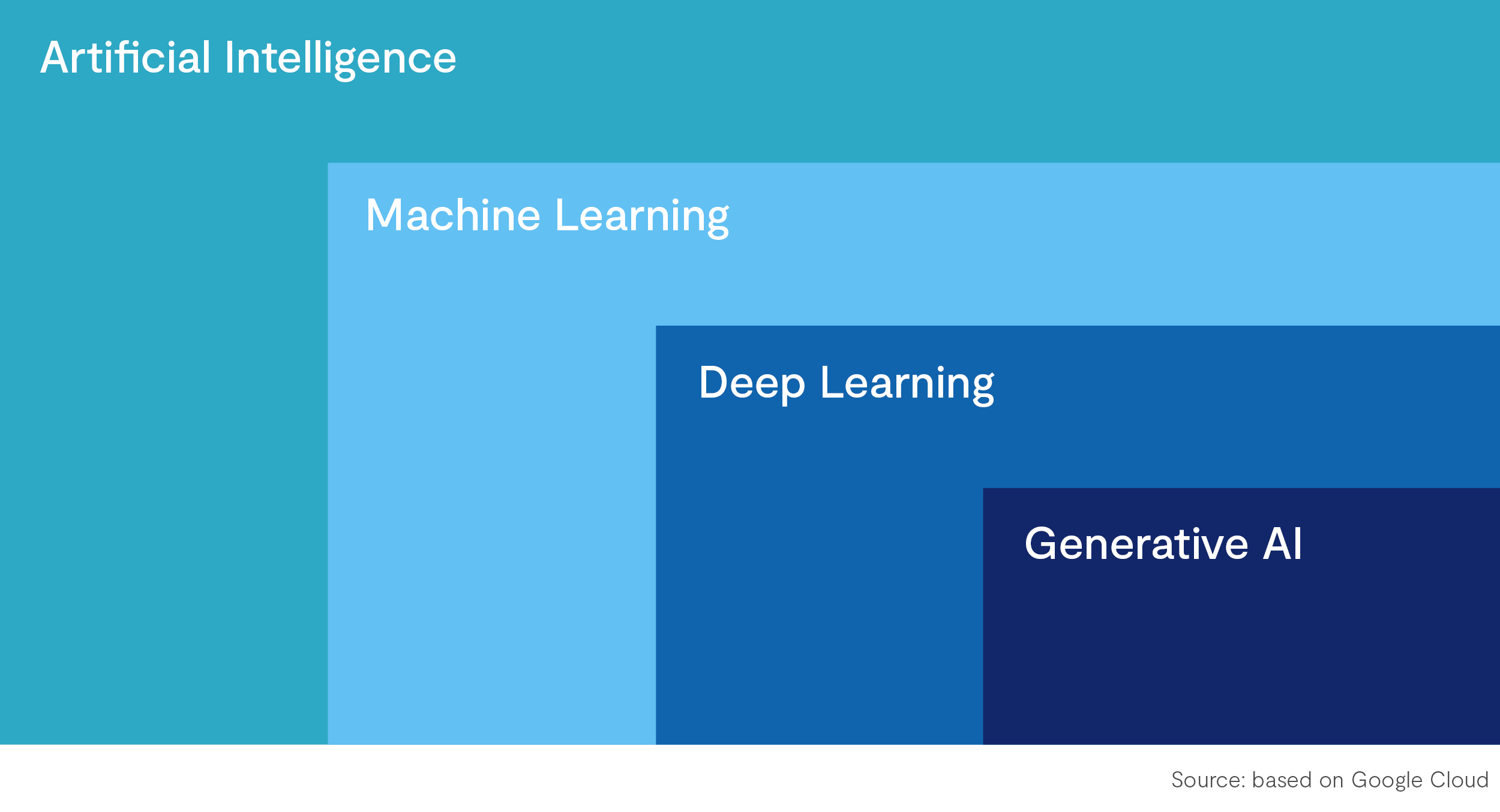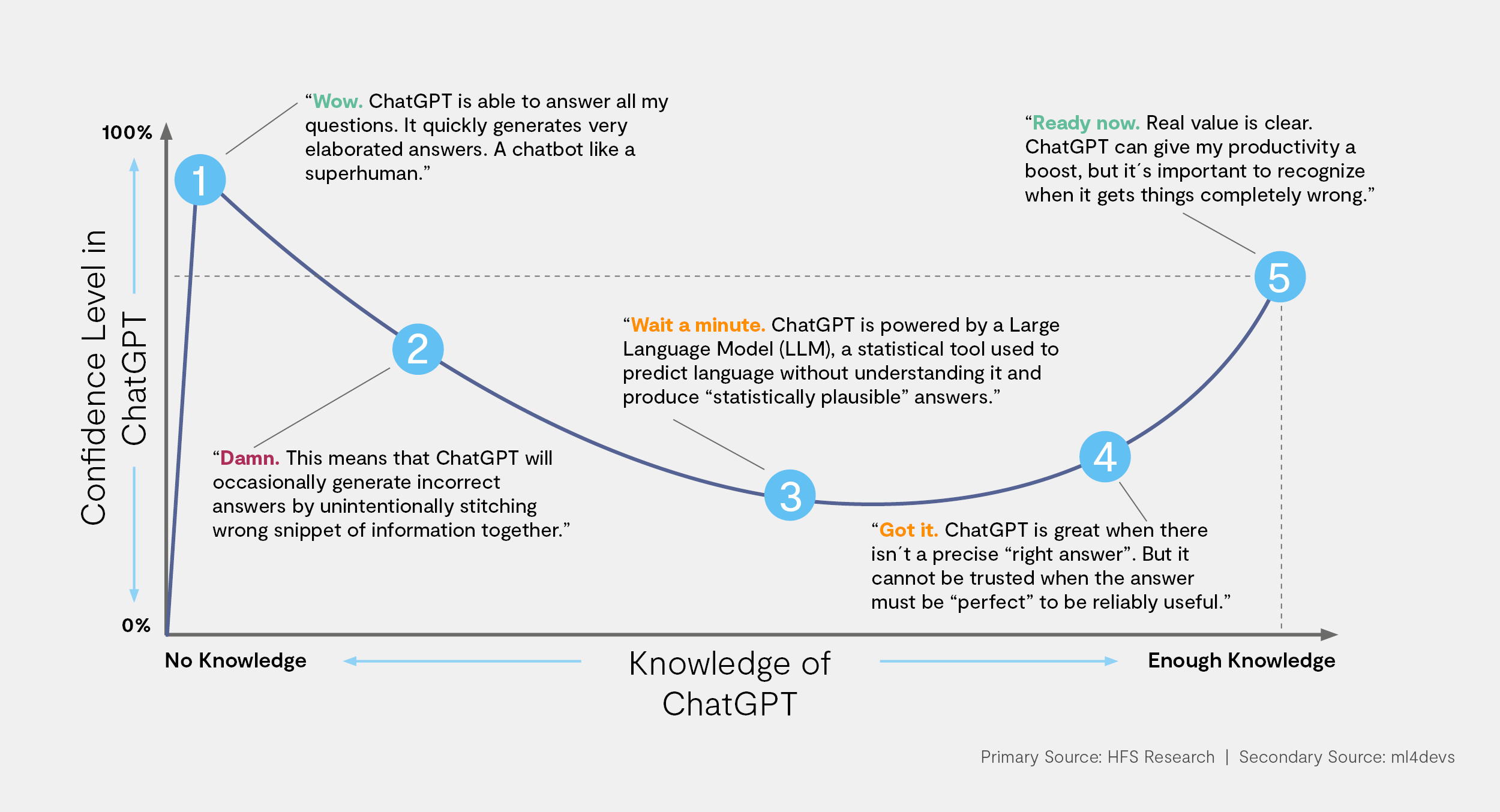- Home
- Consulting
- Consulting Areas
- Generative AI (GenAI)
Generative AI (GenAI)
AI becomes GenAI: A paradigm shift
Reaching new levels of excellence with GenAI
The broad accessibility of Generative ArtificaI Intelligence (AI) to all end users is driving change across all industries. Previously, AI systems and their benefits were only available to experts in a limited circle. Generative AI, on the other hand, is open to many end users through a cross-industry, new tool landscape. As a result, much greater leverage is emerging that will, for example, take the quality of decisions, the efficiency of processes, and the individuality of customer excellence to a whole new level.

What is Generative AI?
AI encompasses the concept of machines that can mimic or augment human intelligence, such as problem solving, pattern recognition, and language understanding. Machine Learning are AI systems that refine their performance by processing more data and learning from observed patterns. The Deep Learning subgroup uses artificial neural networks to model patterns and improve from large amounts of unstructured data. Genetic AI models can generate new content after learning patterns from their training data. (image source)
Use Cases in various industries
Telecommunications
- Customer Service: virtual assistants generated by GenAI assist customers with inquiries, billing, and account management, providing a personalized experience.
- Cybersecurity: Gen AI can perform automated security reviews of code and user environments and assist in securing them.
Public Sector
- Citizen Services: ‘Dark’ processing of standard applications and processes (for example BAföG application) and acting as Information Assistent.
- Automated Tax: Tax Assistant can automatically generate tax declarations for citizens.
Health
- Drug Discovery: protein folding with GenAI etc. enables automated development of new medicine.
- Personalized Medicine: Gene AI enables patient-specific drug generation
Manufacturing & Logistics
- Logistics: Prediction of specific customer demand and adaptation of logistics chains
- Robotics: AI-powered robots can efficiently learn and perform tasks
Human Resources
- Individual learning experiences, AI as tutor.
- Better prediction of role developments and skills.
- Chatbot for recruiting
Others
- Individualized Targeted Advertising: Ads created and modified to match the specific characteristics and requirements of individual customers.
- Business Strategy: Evaluate business models and judge strategy and suggest improvements.
Gen AI: consider possibilities and limitations

Our Services
AI Strategy
- Comprehensive plan that outlines how the organization will use AI to achieve its business objectives. It includes everything from identifying suitable AI use cases, resource allocation (both human and financial), to the necessary infrastructure improvements, timelines for implementation, and how success will be measured.
- Readiness Assessment: Systematic review of an organization's preparedness for the successful implementation and adoption of Artificial Intelligence (AI) technologies. It assesses the existing IT-Infrastructure, Governance, Organisation and Roles that would support or hinder AI adoption.
AI Use Cases Development
- AI Use Case Ideation / Selection,
- AI based Product / Service Design,
- AI based Process Optimization,
- AI based Biz Models,
- AI PoC Development,
- AI Solution Design Implementation
AI Ethics
Responsible AI
- Includes the creation of values, policies, standards, and legal parameters to ensure AI is used responsibly, transparently, and without causing harm.
- Ethics, Regulation and Principles: Avoiding reputational damage, liability, and business engagement
Leadership and Steering
- Leadership: Sets vision, makes decisions, provides resources, champions AI transformation.
- Steering: Provides strategic oversight, ensures AI initiatives align with broader business strategies.
- Roles and Responsibilities: Clearly defined for all involved in AI projects, ensuring clarity on tasks, timelines, and collaboration.
Risk & Compliance
- Risk Management: Identifying, assessing, and managing potential risks in AI projects, including technical (system failures, security breaches), operational (data inaccuracies, inadequate skills), and strategic risks (misalignment with business objectives).
- Compliance: Ensuring AI systems adhere to internal compliance requirements.
AI Foundation
- Infrastructure: Alignment IT and business units.
- Data Management and data quality: Establish robust processes, techniques, and tools for managing, organizing, storing, and maintaining data. Data Quality: Ensure set of values of data variables are accurate, complete, reliable, and relevant.
- IT Processes: Activities for designing, developing, delivering, and supporting IT services.
- IT Architecture: Structure of the organization's IT systems.
- Tool Landscape: Consists of software applications, platforms, and technologies in use.
AI Governance
Organization & Change Management
- Organization: Consists of values, behaviors, shared vision; influences openness to AI.
- Change: Prepares and supports individuals for changes due to AI, such as altered workflows, roles, and skills; crucial for successful AI adoption.
Monitoring
- Implementation of systems to monitor performance (model drift, value generation, usability).
AI Training & Awareness
- Employee training and acceptance to enable employees to use AI tools and ensure user adoption.
- Establish champions in the organization to drive the issue.
Steffen KuhnAnyone digitalizing and implementing technologies such as artificial intelligence has to tackle ethical issues. Not only should companies command the technology but also be able to estimate the consequences of it. Just as security by design has been around for a while, ethics by design should become the rule.
Generative AI will revolutionize business workflows
Automation
Through Automation time-consuming and repetitive tasks, freeing up human time and resources for more complex and strategic work are released.
Creativity
Generate new ideas, designs, and content in areas such as art, music, and writing, enabling humans to expand their creative potential.
Data driven decision making
Generative AI can quickly analyze vast amounts of data and make predictions, allowing organizations to make more informed decisions and improve their overall efficiency.
Personalization at scale
Generative AI can generate highly personalized experiences for users at scale, providing a better user experience and increasing engagement.
Research
Generative AI being used to simulate complex systems and make predictions, aiding in scientific discovery and advancing fields such as medicine and climate science Protein folding as one of the biggest example.
Job creation and Change
Generative AI will create new employment opportunities and change the shape of existing ones, requiring entire industries to change.
Holistic Solutions & Services
In principle, Detecon's Advisory Services are neutral and independent of any one implementer. If our customers so desire, however, they receive everything from a single source, from consulting to design, development, and integration of technological solutions, all the way to operation, in a manner which is interlocked at an early stage. As an advisory pillar in the T-Systems portfolio, Detecon is already working successfully and closely with colleagues at T-Systems on many projects. Solutions such as the AI Solution Factory and the Telekom Data Science Platform enable seamless AI training and development as well as simple deployment via cloud platforms.
Get in touch with us







